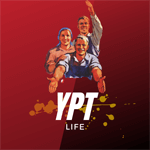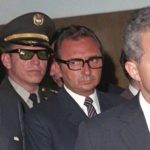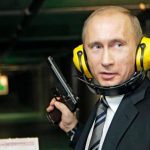Have you ever heard of the fireside chats? Y’know, those radio addresses FDR gave to the Americans in the 30s and 40s. Particularly before the era of widespread live media broadcasting for anything and everything a political figure says, it was pretty revolutionary. All of a sudden the nation’s leader wasn’t miles away, behind massive gates, armed guards and protective concrete, he was right in your living room, talking to you! Just consider the name ‘fireside chat’. It sounds homely. Not some big political rally speech, just a conversation about what’s going on in the country. Its legacy is pretty enormous as a slick piece of political propaganda that did wonders for presidential popularity.
As you might expect, the format has been copied massively throughout the world. Hell, the modern press conference is more or less a continuation of the concept, though the novelty’s worn stale. People aren’t tricked by a politician just because he speaks to them anymore. People are more savvy, they take a more cynical eye and it’s hard to even consider the time when their leaders didn’t talk directly to the people. But… Some leaders had greater ambitions, more of a sense of showmanship! They wanted to make the magic of the fireside chats impressive again. And who else to lead the charge than Hugo Chavez of the Bolivarian Republic of Venezuela.
Venezuela’s Top Talk Program

Aló Presidente was a show that debuted in Venezuela on the 23rd of May 1999. The title stands for ‘Hello Mr. President and that should give you an idea what it’s all about. It was broadcast on Venezuelan state TV and ran until the 29th of January 2012. Unlike the Fireside Chats which were very irregular and quite short, this show ran every Sunday like clockwork, from 11am until roughly 5pm, though they were often quite loose with the time there. What’s more, it was completely unscripted and best of all, it was a call-in show! Random members of the public could ring up their president and ask burning questions! There was surely some kind of vetting process, but many would air legitimate grievances with the government to the actual head of state. It was utterly unique in politics at the time.
The point of the show is obvious. What better way to build up trust? Just talking to people doesn’t work anymore, you have to listen as well! A call show makes perfect sense. The unscripted format gives an opportunity for Chavez to show off his natural charisma, something that carried him well throughout his presidency. On the show, he would often be crowded with supporters or walking the streets of Venezuela like an average citizen. Even if the streets were being cordoned off first to allow for it and the crowds vetted first, the visuals of it were powerful propaganda.
Even more notable is that contrary to the Fireside Chats which were just another method of disseminating information of what had been done in government, Aló Presidente was a show where policy decisions were made live on air. In one notable instance, on March 2nd, 2008, Chavez ordered a top general on the show with him to deploy battalions of soldiers to the Colombian border in response to the killing of a high-ranking FARC member in neighboring Ecuador. The incident sparked a crisis, and it all began live on TV. It could certainly make for some very entertaining television.
The Format of Aló Presidente
Over the years, the show evolved and changed in a number of ways, but I can go over some of the basic concepts here. First of all, there was no strictly defined set. Part of getting away from being seen as divorced from the people was not being in some opulent office all the time, away from everyone! Usually, Chavez would be depicted behind a desk as the presenter, in an entirely new location with a makeshift seating area for members of the public to act as an audience. This could get pretty weird as he wasn’t always even indoors. In one known case, the desk was set up in the middle of a field with cows milling about, while in another it was set up on a beach with women cheering from the sea.
As stated before, the main purpose of the show was as a phone-in, but it was far more than that. Often, other members of the government would be on as guests to be questioned by both Chavez and the public. Sometimes Chavez wouldn’t bother to talk about his role as president and would just talk about himself for a bit, pieces of Venezuelan culture, random factoids, read aloud from books of Marxist theory and even sing some folk tunes. It was as much a variety show as it was a bog-standard talk show, which was for the best since its often grueling six- or seven-hour length could be a bit exhausting without something to break up the monotony.
Often the format was based on where the desk was located. If the desk was at a factory, there’s a good chance Chavez would be visiting and surveying that factory. If it was at a school, there’s a good chance Chavez would be talking about education and such. Those present in the audience were typically locals (who had been vetted beforehand) and opposition figures were nowhere in sight. One consistent weekly segment was a video outlining the policy decisions made that week, summaries of speeches and some economic statistics.
Until episode 82, Chavez was not the sole host. A ‘man on the street’ format would be conducted, where a co-host on-location would conduct live interviews with people on the street. Why this section was ultimately scrapped is hard to say, but perhaps could simply be chalked up to the show increasingly centering around Chavez and Chavez alone.
When looking at the phone-ins, the content would vary. On the first episode, a caller came with four questions for the president, ranging from stabilization of currency to humanitarian prison reform. Another caller in that same episode was from a low-level local ministry who simply asked for personal advice on how to better accomplish his goals. In another episode, a man called in to propose measures for the ministry of education. This gives an idea of the variance of goals the callers would have. Sometimes callers would go further still, with episode 287 seeing a caller accuse Chavez of being misinformed on a land development project. Rather than dismiss him entirely, as one might expect, Chavez asked him to ring back later for a more appropriate slot. Ultimately, Chavez does them rebuke his claims, but not before letting him speak his mind. It’s hard to tell whether this is intentional or not, but it gives the impression of the show being far more open to discussion and not just shutting out opposing viewpoints.
In another notable example, on episode 204, a caller told Chavez that she was currently homeless and did not know what to do. Chavez stated that he would personally pass her number to the ministry of housing, who at that time were embarking on a massive housing program to try and alleviate Venezuela’s crippling homelessness issue. Actions like this must have given a whole lot of viewers hope that coming onto the show could fix their problems and that Chavez was truly a man of the people and a man of his word.
Some of the guests Chavez had on wouldn’t be political figures at all. He would have artists, poets and musicians, with episode 314 seeing Chavez dancing along to a ‘revolutionary’ rap duo and their dance partners. Most episodes of the show ended with some kind of musical act, bringing more entertainment into what easily could be a dismally dry few hours. The Bolivarian revolution placed great emphasis on local and indigenous culture, so those were especially highlighted.
Major Changes to Aló Presidente
In the earliest years of the show, the entire point was to communicate with the public. It’s very much in the title, “Hello Mr. President!” but as time wore on, this became less and less a core focus. Oh, Chavez still talked to people, but while the first fifty episodes consistently saw anywhere between four and thirteen calls per episode, a gradual downward slide could be witnessed. Beyond episode 150, there were never more than four phone calls per episode. After episode 300, the average was one, two or none at all. The show ended after 378 episodes. As the core of Bolivarian ideology was the participation of all the people in democracy, this was a curious trend, though perhaps to be expected due to the sheer difficulty of taking each individual call seriously and following up on promises made.
The de-emphasizing of participation in the democratic process was reflected pretty quickly in how the show began. The initial introduction referred to the show as a “space of opinion and popular participation” but by episode 29 had changed to “the head of State analyses in depth themes of interest as well as interacts directly with Venezuelans”. A subtle but significant difference.
What likely didn’t help matters with regard to rolling the dice on publicly inviting scrutiny and promises which may not be kept is the coalescing of a stronger Venezuelan opposition. The lessening of phone calls could be seen as depriving them of ‘ammo’ so to speak. On the 10th of December 2001, a national strike occurred which no-doubt further urged Chavez to use caution in how he presented his program, for the sake of his image. Even worse, the 12th of April 2002 saw a coup that temporarily ousted Chavez from power altogether. Due to mass opposition, Chavez returned to power two days later, but the incident no-doubt influenced the show going forward. During the first episode after the coup, Chavez took only one phone call.
On the 15th of June 2003, Chavez began the first of many ‘missions’ which were announced on Aló Presidente, which were government service plans aimed at improving the general quality of life. The first mission was a mass literacy plan. Many tuned in specifically to hear about what new ‘missions’ would be announced and how it might affect their everyday life.
In January of 2005, the show changed dramatically after going off-air for two months. Participation to the show was to be re-emphasized, with citizen groups invited on as guests and a new section called ‘In Private with the President’ was added to formalize interviews which until then had been far less present. It was episode 210 where Chavez officially announced the socialist character of the Bolivarian revolution which was to be more in line with this participatory nature. And… Yes. Until this point, Chavez and the Bolivarian revolution were not strictly referred to as socialist. There was a socialist character, sure, but it had always been referred to as a ‘third way’. It was only after sweeping electoral victories which secured Chavez’s party power that he felt free to come out with this information, announcing ‘Socialism of the 21st Century’ as the model to follow.
The show began to change somewhat. Rather than a place of discussion, it had become a place of education, with Chavez as the paternal educator, teaching the masses his theories of how Venezuelan socialism could function while being less involved in taking questions as he once had. Much of the old content remained, but political education took on a much stronger focus.
Decline and Demise of Aló Presidente
As time wore on, the interviews lessened further still, often being little more than meaningless meet and greets with members of the public. When people were invited on, it was often to speak of their problems so that Chavez could resolve them and thus increase his standing. With his power secured far more than before, he was at last in a position to do so. The budget of the Presidency in 2010 had increased by 648% from the previous year, with approximately $1.545 million granted for Chavez’s personal discretion. This fund was used primarily to avoid going through hoops and meeting failures when granting the wishes of guests on Aló Presidente.
Mass waves of nationalizations began to occur on the show, with Chavez even having his own catchphrase, where he would point at a building he was going to nationalize and shout “Exprópiese!”. This trend had always existed but reached new heights from 2010 onwards and became a major component of the show. Decisions to expropriate private property were often seemingly taken at a whim, with some property owners being completely caught off guard. To his opponents, this made him hated and feared. To his supporters, the effect was intoxicating.
The example of Aló Presidente was picked up on in neighboring countries, with Rafael Correa of Ecuador, Evo Morales of Bolivia and Mauricio Funes of El Salvador creating their own copy-cat shows in an attempt to reach the same dizzying heights of popularity. There was mixed success with this method and many were cancelled after a fairly short stint on the air, but it ingrained its way into popular consciousness much like the Fireside Chats had long ago, providing inspiration to a number of other leaders across the world when they wished to do something to improve their public relations.
Between June of 2011 and January of 2012, the show went on hiatus as Chavez sought cancer treatment in Cuba. Chavez did in fact ultimately return to the show but looking noticeably frailer. Even after winning the subsequent presidential election in October of that year, many doubted that Chavez would last much longer in his position. On the 29th of January 2012, the show went on hiatus once more, this time for good as Chavez’s illness made him unable to present the show. On the 3rd of March 2013, Hugo Chavez passed away from his illness.
While a divisive figure for many, to Chavez’s legions of supporters who made up at least more than half of the population, the death was catastrophic. Mass mourning occurred and people missed their Presidente. Just days after the state funeral, Nicolas Maduro announced the launching of three-hour rerun episodes made up of compilations of Aló Presidente’s best moments. This show was to be called Aló Commandante, which continues to run on Sundays.
Soon, Nicolas Maduro was sworn in as the new president and rather than taking up the mantle of Aló Presidente, a new show began airing on Tuesdays called En Contacto con Maduro (In Contact with Maduro) which… Just isn’t the same. He isn’t as charismatic and doesn’t even pretend to be as good as Chavez, merely expressing himself as a humble inheritor of his legacy. Chavez’s are indeed big shoes to fill and Maduro’s attempts to fill them have been an ongoing issue. In many ways, it is still the legacy of Chavez alone that propels the Bolivarian revolution onwards, to wherever it may head next.



